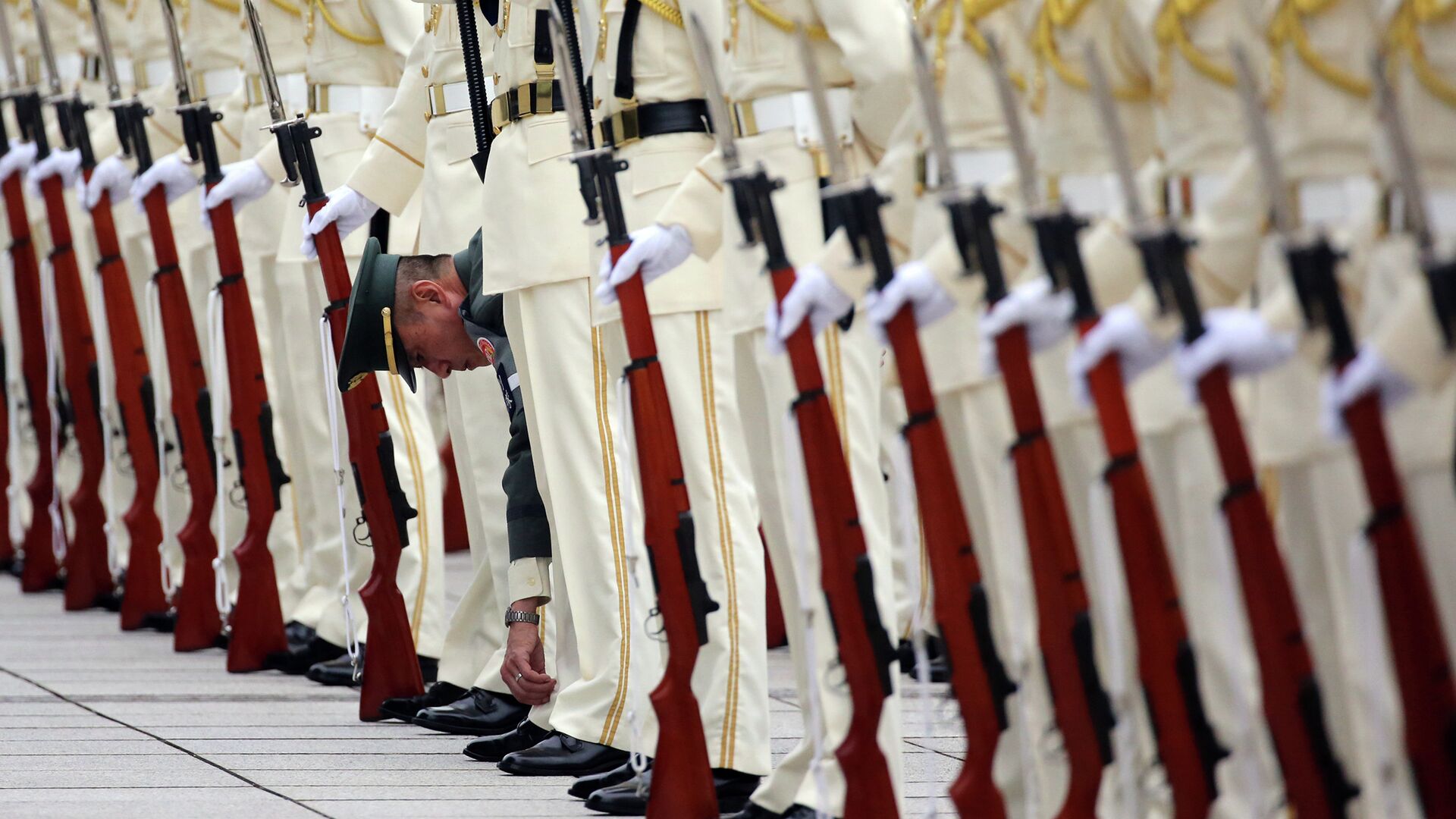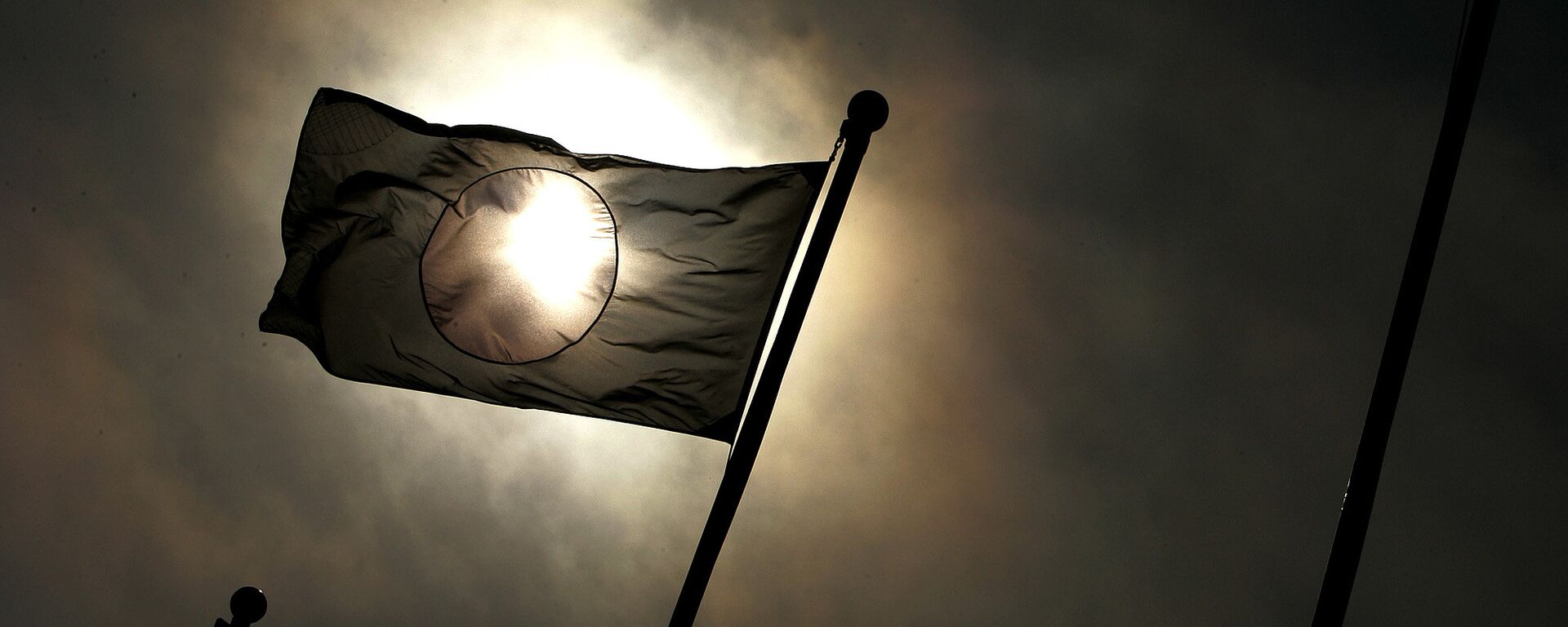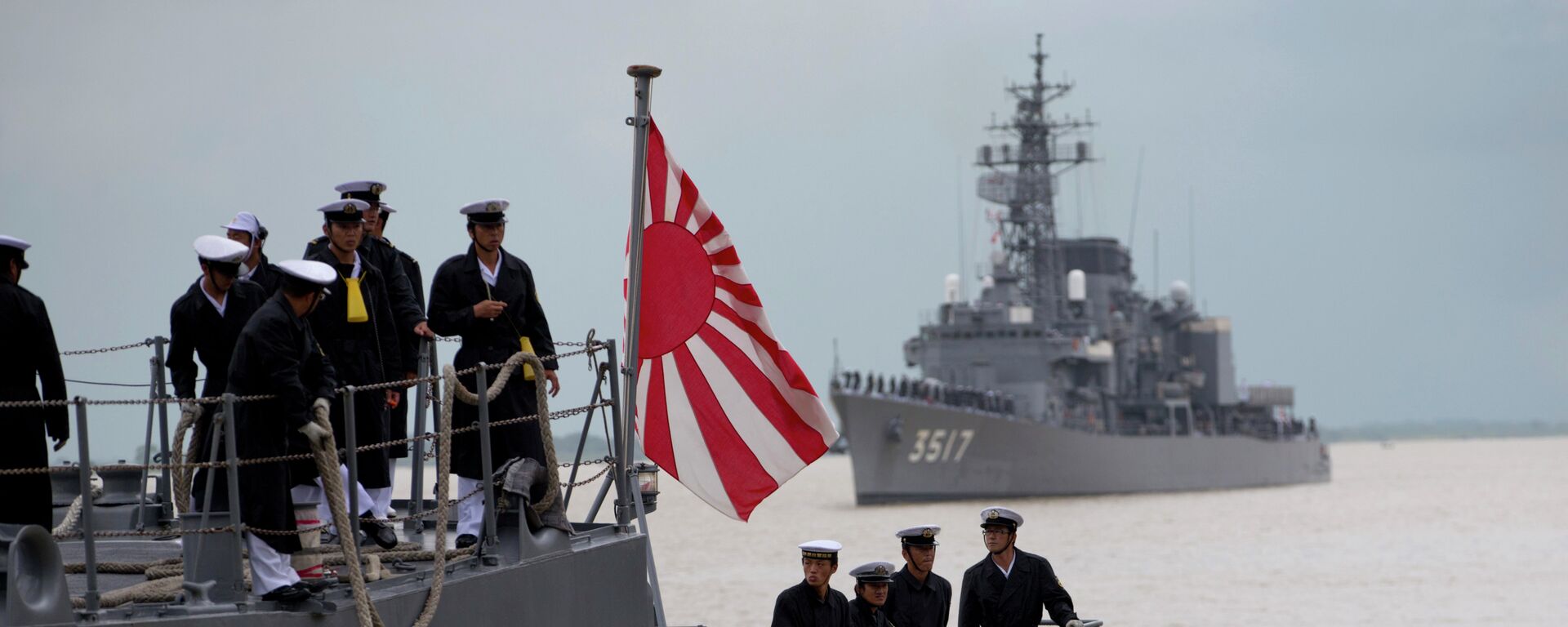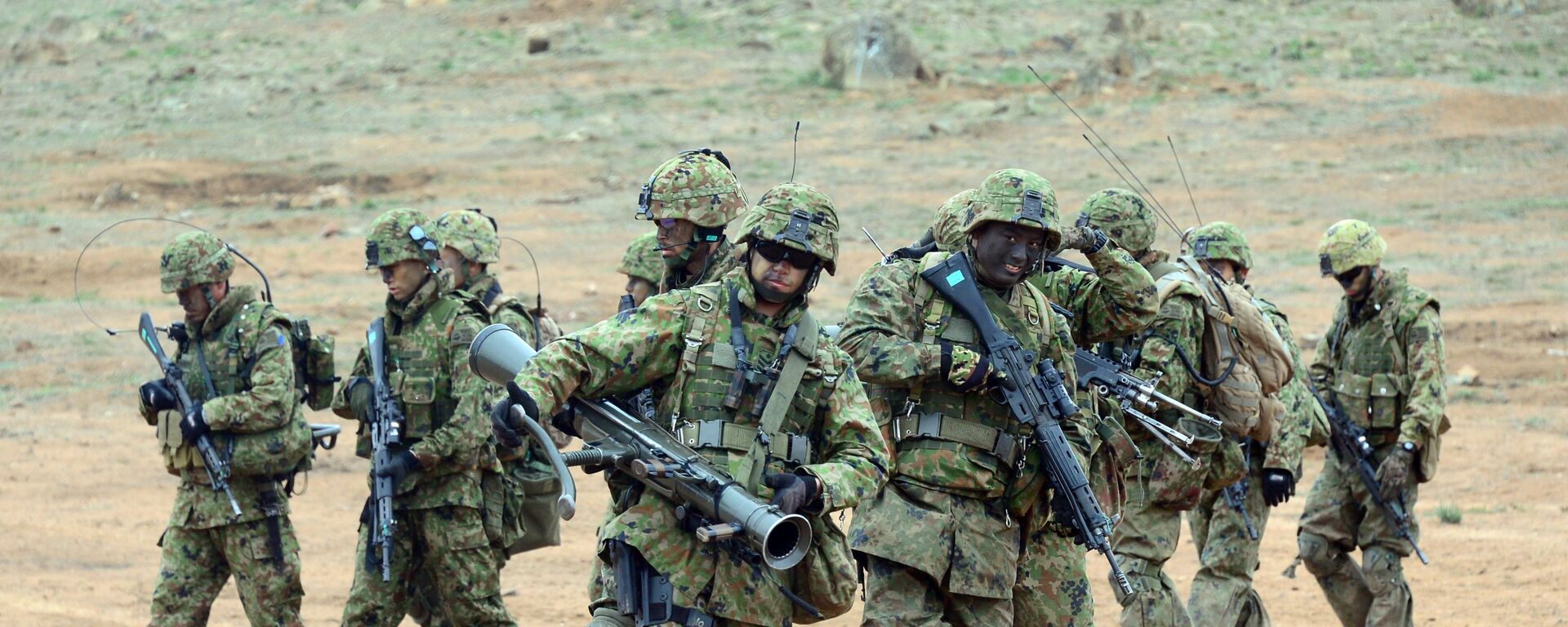https://sputnikglobe.com/20230802/north-korea-accuses-japan-of-reverting-to-militarism-1112341232.html
North Korea Accuses Japan of Reverting to Militarism
North Korea Accuses Japan of Reverting to Militarism
Sputnik International
Japan's claim of having been threatened by neighboring countries is a smokescreen to justify Tokyo's scheme to turn itself into a major military power, the North Korean media contends.
2023-08-02T12:53+0000
2023-08-02T12:53+0000
2023-09-18T13:37+0000
japan
world
opinion
us
fumio kishida
russia
aukus
national security strategy
military
japan self-defense forces
https://cdn1.img.sputnikglobe.com/img/102469/16/1024691660_0:103:3001:1791_1920x0_80_0_0_dd18a2a6fe99d492fe709b55d5c015cb.jpg
On July 28, Japan released the 2023 Defense White Paper, approved by Prime Minister Fumio Kishida and his government, warning about an "advent of a new crisis era". Per the 510-page Japanese doctrine, North Korea, China and Russia contribute to "the most severe and complicated security environment after the Second World War".In particular, the white paper described Russia as "serious security anxiety"; China as its "unprecedented biggest strategic challenge"; and defined the Democratic People's Republic of Korea (DPRK) as "a more grave and urgent threat to Japan's security than before", asserting that "it is escalating a provocation reminiscent of more actual fighting."According to the North Korean media, Tokyo's alarmism is nothing else than an attempt to justify its unprecedented military buildup in the Asia-Pacific region under the pretext of a perceived "threat" from its neighbors.The DPRK's media took aim at and castigated Japan's claim that Russia's special military operation in Ukraine was prompted by the "lack of deterrence" from the Kiev regime. According to North Korea, Japan has jumped on the US bandwagon that has been escalating tensions in the Asia Pacific region for quite a while.The press report particularly referred to Korea's history, stressing that in the past, a bellicose Japan "swallowed up Korea as a colony"; "made desperate efforts to occupy the Asian continent by taking advantage of the Second World War"; and then laid the groundwork for further militarization during the Cold War under the pretext of the "threat" posed by the USSR.The North Korean report notes that Japan should draw lessons from its history and understand that the best way to ensure regional security is to "establish friendly relations with neighboring countries", instead of militarization and muscle-flexing.In December 2022, the Japanese Prime Minister Fumio Kishida’s government approved three policy documents – the National Security Strategy (NSS), the National Defense Strategy and the Defense Buildup Program – which envisaged doubling the nation's defense spending within the next five years.Article 9 of Japan's Constitution specifically restricts offensive actions by the nation's military. However, in January 2023, Western media suggested that Japan was gradually "scrapping" its post-WW2 pacifist defense strategy.The ongoing military buildup in Japan comes alongside that of the US. Washington has been beefing up its military presence in the Asia Pacific zone along with the UK and Australia within the framework of the tripartite AUKUS alliance. The US Indo-Pacific Command openly cited the goal of "deterring" China, Russia and the DPRK.
https://sputnikglobe.com/20230728/japans-white-paper-reveals-plan-to-multiply--defense-spending-across-7-areas-1112202603.html
https://sputnikglobe.com/20230612/what-are-japans-new-defensive-anti-ship-cruise-missile-targets-1111092642.html
https://sputnikglobe.com/20230722/japan-doesnt-want-to-fight-for-taiwan-and-neither-do-other-us-allies-1112066099.html
japan
russia
southeast asia
north korea
Sputnik International
feedback@sputniknews.com
+74956456601
MIA „Rossiya Segodnya“
2023
News
en_EN
Sputnik International
feedback@sputniknews.com
+74956456601
MIA „Rossiya Segodnya“
Sputnik International
feedback@sputniknews.com
+74956456601
MIA „Rossiya Segodnya“
japanese military doctrine, 2023 defense white paper, japan constitution, japan pacifist constitution, japan military buildup, asia pacific, indo pacific, biden indo pacific strategy, japanese military budget, aukus, quad, north korea, dprk, japan militarization, japan major military power, japanese self-defense forces, japan increased military spending
japanese military doctrine, 2023 defense white paper, japan constitution, japan pacifist constitution, japan military buildup, asia pacific, indo pacific, biden indo pacific strategy, japanese military budget, aukus, quad, north korea, dprk, japan militarization, japan major military power, japanese self-defense forces, japan increased military spending
North Korea Accuses Japan of Reverting to Militarism
12:53 GMT 02.08.2023 (Updated: 13:37 GMT 18.09.2023) Japan's claim of having been threatened by neighboring countries is a smokescreen to justify Tokyo's scheme to turn itself into a major military power, the North Korean media contends.
On July 28, Japan released the 2023 Defense White Paper, approved by Prime Minister Fumio Kishida and his government, warning about an "advent of a new crisis era". Per the 510-page Japanese doctrine, North Korea, China and Russia contribute to "the most severe and complicated security environment after the Second World War".
In particular, the white paper described Russia as "serious security anxiety"; China as its "unprecedented biggest strategic challenge"; and defined the Democratic People's Republic of Korea (DPRK) as "a more grave and urgent threat to Japan's security than before", asserting that "it is escalating a provocation reminiscent of more actual fighting."
According to the North Korean media, Tokyo's alarmism is nothing else than an attempt to justify its
unprecedented military buildup in the Asia-Pacific region under the pretext of a perceived "threat" from its neighbors.
The DPRK's media took aim at and castigated Japan's claim that Russia's special military operation in Ukraine was prompted by the "lack of deterrence" from the Kiev regime. According to North Korea, Japan has jumped on the US bandwagon that has been escalating tensions in the Asia Pacific region for quite a while.
"It has been widely recognized that the US and its followers are the chieftain that cooked up various forms of confrontational alliance in the vast Asia-Pacific region and totally destroys regional peace and stability by continuously sending a nuclear carrier task force, nuclear strategic bombers and other strategic assets to the Korean peninsula, the Taiwan Strait and other hotspots," the DPRK media report reads.
The press report particularly referred to Korea's history, stressing that in the past, a bellicose Japan "swallowed up Korea as a colony"; "made desperate efforts to occupy the Asian continent by taking advantage of the Second World War"; and then laid the groundwork for further militarization during the Cold War under the pretext of the "threat" posed by the USSR.
The North Korean report notes that Japan should draw lessons from its history and understand that the best way to ensure regional security is to "establish friendly relations with neighboring countries", instead of militarization and muscle-flexing.
In December 2022, the Japanese Prime Minister Fumio Kishida’s government approved three policy documents – the
National Security Strategy (NSS), the
National Defense Strategy and the
Defense Buildup Program – which envisaged doubling the nation's
defense spending within the next five years.
Article 9 of Japan's Constitution specifically restricts offensive actions by the nation's military. However, in January 2023, Western media suggested that Japan was gradually "scrapping" its post-WW2 pacifist defense strategy.
The ongoing military buildup in Japan comes alongside that of the US. Washington has been beefing up its military presence in the Asia Pacific zone along with the UK and Australia within the framework of the tripartite AUKUS alliance. The US Indo-Pacific Command openly cited the goal of
"deterring" China, Russia and the DPRK.





